Members of the consortium
University of Vienna
- Matthew Pelowski
- Helmut Leder
- Corinna Kühnapfel
- MacKenzie Trupp
- Blanca T. M. Spee
- Draško Boko
University of Amsterdam
- Eftychia Stamkou
- Gerben van Kleef
- Rohan Dunham
- Yağmur Özbay
Humboldt-Universität zu Berlin
- Joerg Fingerhut
- Michael Pauen
University of Arts in Belgrade
- Milena Dragićević Šešić
- Nina Mihaljinac
- Ljiljana Rogač Mijatović
Aarhus University
- Katrin Heimann
- Andreas Roepstorff
Weißensee Academy of Art Berlin
- Ulf Aminde
- Christine Goutrié
Royal Holloway, University of London
- Manos Tsakiris
IFNU Berlin
- Mazda Adli
University of Oxford
- Sarah Hegenbart
- Anthony Gardner
External Collaborators
Strategic Advisory Board
Dr. Eleonora Belfiore

Dr. Eleonora Belfiore
Professor of Communication and Media Studies in the Department of Communication, Media, Social and Policy Studies, Loughborough University, UK. International expert on cultural policy-making. Previous Director of Studies for the Warwick Commission on the Future of Cultural Value and co-author of the report “Enriching Britain: Culture, Creativity, and Growth” (2015). Creator and Editor of the blog “The Cultural Value Initiative” (http://culturalvalueinitiative.org/) which unites perspectives from academia, creative practice, arts management, policy-making and media cultural commentary. Author of multiple texts discussing the potential and the limitations of empirically-grounded policy making with the arts.
Dr. Horst Bredekamp

Dr. Horst Bredekamp
Professor of Art History, Humboldt-Universität zu Berlin, DE. Permanent Fellow of the Institute of Advanced Study, Berlin. Founder of “The Technical Image” at the Hermann von Helmholtz-Centre for Cultural Techniques (HZK), and director of DFG- Kolleg research group “Picture Act and Embodiment” at the Humboldt-Universität zu Berlin. Expert on socio-political discussions of art and political iconography, embedding of art interaction into philosophical/art-historical perspectives, the relation of art and technology, and new media.
Dr. Svetlana Hristova

Dr. Svetlana Hristova
Associate Professor, Faculty of Arts, South-West University, Blagoevgrad, BG. Previous head (2000-2004) of the Department of Cultural Studies. Director of the “Center for Intercultural Dialogue and Integration” (2001-2009). Has research and policy expertise in art and creativity initiatives in urban areas and considering sustainability. In 2009, she initiated the Working Group “Urban Management and Cultural Policies of City” at ENCATC, which evolved into a Thematic Area. Co-organizer of various conferences: e.g., “The Role of Artists in Social Participation: The Contribution of Arts and Culture to Social Sustainability of Cities” (Utrecht, 2010). Vice-Chair of Section of Urban Sociology at the Bulgarian Sociological Association and member of “Management Committee of the COST Action IS1007 Investigating Cultural Sustainability” (2011-2015).
Pascale Bonniel Chalier
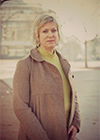
Pascale Bonniel Chalier
Founder of “La Terre Est Ronde,” a support platform for cultural professionals. Devised the Development of Artistic Projects and International Cultures master’s course at the Lyon II University. Specialist in cultural policies, she teaches at several higher education institutes and conducts studies and research for regional authorities and social partners. Pascale Bonniel Chalier also had a seven-year spell as Deputy Mayor of Lyon.
Matteo Rosati

Matteo Rosati
Matteo Rosati is programme officer of the Culture Unit at UNESCO Office in Venice.He works at the definition and implementation of activities for the enhancement of South-Eastern European cultural heritage. He holds a Master’s Degree in Communication Sciences. He is the winner of UN-DESA (United Nations Department of Economic and Social Affairs) Fellowship Programme in 2001. Previous work experiences include: international cooperation with European Commission (2000), Italian Embassy in Sarajevo, Bosnia and Herzegovina (2001-2003), World Bank (2004), International Management Group (2005). He joined UNESCO in 2005.
University of Vienna (UNIVIE) AT
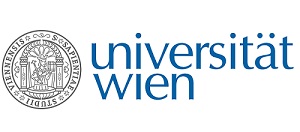
University of Vienna (UNIVIE) AT
Specific Department: Faculty of Psychology, Department of Cognition, Emotion, and Methods in Psychology.
Main individuals carrying out task:
(1) Ass.-Prof. Matthew Pelowski, PhD, Faculty of Psychology, Department of Cognition, Emotion, and Methods in Psychology. Member of the Vienna Cognitive Science Hub;
(2) Univ.-Prof. Dr. Helmut Leder, Faculty of Psychology, Department of Cognition, Emotion, and Methods in Psychology. Speaker of the Vienna Cognitive Science Hub;
(3) Corinna Kühnapfel, PhD candidate, Faculty of Psychology, Department of Cognition, Emotion, and Methods in Psychology;
(4) MacKenzie Trupp, PhD candidate, Faculty of Psychology, Department of Cognition, Emotion, and Methods in Psychology;
(5) Blanca T. M. Spee, PhD candidate, Faculty of Psychology, Department of Cognition, Emotion, and Methods in Psychology;
(6) Draško Boko, ARTIS project manager, Faculty of Psychology, Department of Cognition, Emotion, and Methods in Psychology.
Ass.-Prof. Matthew Pelowski, PhD
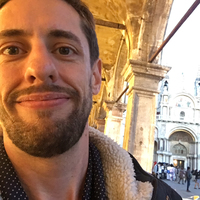
Ass.-Prof. Matthew Pelowski, PhD
Matthew Pelowski is currently assistant professor of Psychology in Cognitive and Neuroaesthetics at the Department of Cognition, Emotion, and Methods in Psychology and the Vienna Cognitive Science Hub. His academic work is specifically focused on the topic of empirical study of profound art and museum experience. He developed the first theoretical model of transformative art experiences (Pelowski & Akiba, 2011), extending from Prof. Leder’s earlier work, and has since refined this in a major new update, leading to the main theoretical model and empirical behavioral measures (Pelowski, Leder et al., 2017) which will serve as the basis for this project’s empirical WPs. He has published over 40 papers in leading journals, including important empirical studies of art experiences in museums throughout Japan, North America, and Europe. He has also published major reviews on best practice in museum study (Pelowski et al., 2017) and pioneering work detailing new behavioral and physiological methods for documenting and uncovering ecologically-valid, museum art experience. He also spearheaded the empirical studies and research collaborations employing Network modelling and latent class analysis for data- driven methods of quantifying varieties of art experience, and co-developed and has been running the Archive of Art Experiences Project which will also be extended in the present program.
He has further worked to expand his repertoire to investigations of art and the brain, first as a postdoc at the Nagoya University, Laboratory of Cognitive Informatics, one of the first laboratories to utilize fNIRS technology, which he applied to art-viewing. He has published multiple empirical and theoretical papers on fNIRS, as well as hyperscanning, and spearheaded (with his collaboration partners) the state-of-the-art analytical approaches which will be employed here. From 2015-2017 he also led a Marie Curie project to integrate causative (tDCS) and brain imaging methods with the study of art. In addition, he has developed projects and papers regarding the relation of art engagement to social factors, empathy, and/or perspective taking, mobile eye and movement tracking in museums. He was recognized with the Baumgarten Award for outstanding contributions by young scientists by the International Association of Empirical Aesthetics (2016). He also has experience in large projects focused on societal challenges-for example assessing social, cultural, and infrastructural factors underlying media and technology use, or factors and solutions for modulating parent decisions to register new-born children in Kenya.
Univ.-Prof. Dr. Helmut Leder
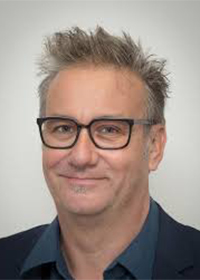
Univ.-Prof. Dr. Helmut Leder
Prof. Leder is one of the world’s leading researchers in the field of empirical aesthetics. He studies human aesthetic experiences, regarding a variety of objects, and contexts, from neurophysiological laboratory studies, to field studies in museum and outdoors. He studies (i) what are the cognitive and emotional mechanisms that determine what we like – and find aesthetically pleasing, (ii) what is the nature of aesthetic experiences, and (iii) what effects has beauty on our perception, feeling, well-being. He uses a broad range of research methods, with a major focus on behavioral measures (evaluations, scales, eye-tracking) and physiology (FacialEMG, EEG, tDCS, Nirs). His work is distinctively interdisciplinary, e.g. including collaborations with art history, the fine arts and biology. With his appointment in 2004 as Professor of General Psychology at University of Vienna, he founded an official research focus (Faculty level) in Empirical Aesthetics, which was the first of its kind, and has a leading role in various areas of empirical aesthetics (faces, design, art, museum studies, emotion). Helmut Leder will also contribute his expertise from acting as Head of Department (from 2004 to 2020), as Speaker of the interdisciplinary research institution Vienna Cognitive Science Hub, and co-founder of the doctoral school CoBeNe. Helmut Leder has published more than 150 peer-reviewed papers, in various fields of empirical aesthetics and visual perception. From 2014 until 2018 he was the president of the International Association of Empirical Aesthetics (IAEA) and organized the biannual international Conference of IAEA 2016 in Vienna. In Vienna, fruitful collaborations with the art history department, the University of Applied Arts, and various museums have been consolidated. He was a Founding International Member of the Global Institute of Advanced Studies (GIAS at NYU), International Consultant of the UMA Project (PI Hekkert, TU Delft), and has received several grants (FWF, DFG, WWTF, MC EU; Austrian Ministry, UNIVIE). In 2018 he was a visiting professor at Keio University, Tokyo and a Fellow at the Italian Academy of Advanced Studies in America, at Columbia University, N.Y.
Additional collaborators and human resources
Beyond the project team, the EVA Lab comprises two postdocs, four doctorate students, research assistants and support by a full-time technician, all of whom will contribute. In addition to the EVA Lab, the Department of Basic Psychological Research also includes the Social, Cognitive, and Affective (SCAN) Unit (Lamm), which specializes in neuroimaging and empathy. The project will also be integrated into the Cognitive Science Research Platform, which has a focus of strengthening interdisciplinary research efforts. The project team is also connected to Cultural Psychology (Slunecko), Cognitive Biology (Fitch, Huber, Bugnyar), and has an ongoing research collaboration with Art History (Prof. Rosenberg, Cognitive Research in Art History Lab, University of Vienna). The University provides a full range of project management support services to project staff through the Research Services and Finance Departments, in addition to specific support services e.g. ethics and Open Access.
Corinna Kühnapfel
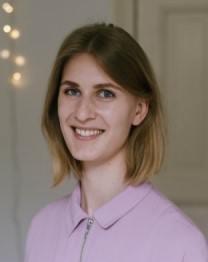
Corinna Kühnapfel
Corinna Kühnapfel is a PhD candidate in the ARTIS project at the Department of Cognition, Emotion, and Methods in Psychology at the University of Vienna.
She has a background in cognitive science and embodied cognition with a focus on empirical aesthetics and neuroaesthetics. In her PhD she investigates the role of the body in the experience and evaluation of art by considering physical engagement, movement patterns, physiological responses and interoception. She is particularly interested in the effect of the special modes of engagement offered by installation art, such as viewer placement, bodily awareness and active exploration and how these create conditions for engaged, insightful, and self-reflective experiences.
She is also a co-founder of EDGE e.V., a non-profit organisation that communicates neuroscientific concepts to the public through workshops and multimedia exhibitions and functions as a network to initiate exchange and collaboration between artists and scientists.
MacKenzie Trupp
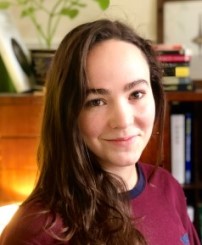
MacKenzie Trupp
MacKenzie Trupp is currently a PhD candidate at the Faculty of Psychology, University of Vienna, studying at the intersection of art and science.
After studying psychology and art history in the United States, she went on to graduate as part of the first MSc cohort of Psychology of the Arts, Neuroaesthetics, and Creativity at Goldsmiths, University of London, with a focus on the role of cardiac interoception in moving aesthetic experiences.
Now based in Vienna, she aims to explore if, how, and why viewing art can enhance wellbeing, and whom can benefit the best from it.
Blanca T. M. Spee

Blanca T. M. Spee
Blanca T. M. Spee is currently a PhD candidate and project team member within the ARTIS project at the Department of Cognition, Emotion, and Methods in Psychology at the University of Vienna. In addition, she is a scholar at the Radboud University Medical Center of Expertise for Parkinson & Movement Disorders in the Netherlands. Since 2017 she has also been coordinator at the Vienna Cognitive Science Hub, establishing interdisciplinary research at the University of Vienna.
She already has many years of experience working in the private sector and her academic training covers business administration with a focus on information technologies, as well as psychology. The focus of her PhD thesis research lies on connecting empirical art research with neuropsychopharmacological approaches. Besides her interest in neuropsychopharmacology and neuroaesthetics, she has a special focus on research in Parkinson’s disease, dementia, and other neurodegenerative disorders approaching art, aesthetics, and creativity.
To build a theoretical foundation for her research, she aims to discover new approaches that emphasize network-based processing, considering predictive processing frameworks and enactivist perspectives. A main future aim is to use this research for translational health science and creativity-based art therapies.
Draško Boko
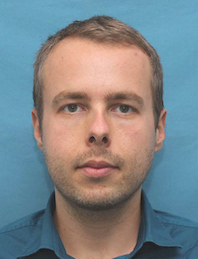
Draško Boko
Draško Boko is currently working as ARTIS project manager at the Department of Cognition, Emotion, and Methods in Psychology at the University of Vienna.
He obtained his MSc degree in Biology from the University of Zagreb and his PhD degree in Molecular Biology from the University of Vienna.
In addition to his research background, he also has professional experience in managing research projects, as well as in the context of EU institutions.
University of Amsterdam (UvA) NL

University of Amsterdam (UvA) NL
Specific Department: Department of Psychology, Faculty of Social and Behavioural Sciences.
Main individuals carrying out task
(1) Dr. Eftychia Stamkou, Asst. Professor, Social Psychology, Department of Psychology, Faculty of Social and Behavioural Sciences;
(2) Prof. Dr. Gerben van Kleef, Professor and Head of Social Psychology, Department of Psychology, Faculty of Social and Behavioural Sciences;
(3) Rohan Dunham, PhD candidate in Social Psychology, Department of Psychology, Faculty of Social and Behavioural Sciences;
(4) Yağmur Özbay, PhD candidate in Social Psychology, Department of Psychology, Faculty of Social and Behavioural Sciences.
Dr. Eftychia Stamkou
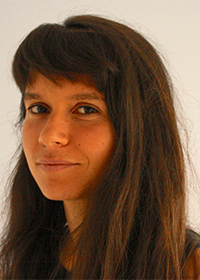
Dr. Eftychia Stamkou
Dr. Stamkou is currently a tenured assistant professor of Social Psychology at the University of Amsterdam, has been a visiting scholar at Columbia University of New York, and has worked as research consultant to Adidas. She completed her graduate and postgraduate studies with distinction in 2018 (cum laude) and has also obtained a degree in music composition in 2009 (cum laude). Her dissertation was a finalist for two prestigious Best Dissertation Awards in the fields of social and cross-cultural psychology. Her research has been published at the flagship journal of social psychology (i.e., JPSP) and other acknowledged journals (e.g., PSPB, GPIR, JESP).
She has been awarded a competitive doctoral grant (Research Talent Grant, NWO), a Fulbright postdoctoral scholarship, and a total of €238,332 in grant money. She developed and is currently coordinating the Cultural Psychology Master’s at the UvA, where she has an active role in mentoring master’s students.
Her current collaborators include eminent scholars in the fields of social psychology (Prof. Galinsky, Columbia University), cultural psychology (Prof. Gelfand, University of Maryland), and empirical aesthetics (Prof. Leder and Dr. Pelowski, University of Vienna).
Prof. Gerben A. Van Kleef
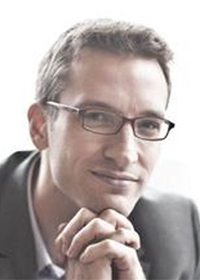
Fotograaf: Oerlemans
Prof. Gerben A. Van Kleef
Prof. Gerben A. Van Kleef is currently Chair of the Social Psychology Group of the Psychology Department at the UvA. Between 2012 and 2016 he held an extraordinary professorship of prosocial behavior on behalf of the Royal Netherlands Academy of Arts and Sciences and in 2014 he was a visiting professor at Columbia University. Prof. Van Kleef is one of the leading scientists in social psychology, with a wide range of expertise on social power, social hierarchies, leadership, and emotions. He published 112 articles in top-tier journals, including Science (IF=37.2) and Behavioural and Brain Sciences (IF=15.07).
Prof. Van Kleef has also authored a textbook and a popular science book, and his research has been publicized through various mass media outlets (radio, TV, newspapers). His work has been cited more than 11,000 times (h-index: 55) and has attracted much funding (total of ~€2 million) including the prestigious VENI and VIDI research grants. He won numerous awards for his extensive scientific contributions, such as the bi-annual Best Dissertation Award of the International Association for Conflict Management (IACM), the Best Dissertation Award of the Dutch Association for Social Psychology (ASPO), the early career award of the European Association of Social Psychology (EASP), the Most Influential Paper Award of the Academy of Management (AOM), and the Outstanding Book Award of the IACM. Prof. Van Kleef has supervised 4 post- docs and 15 PhD-students. He is the founding director of the Amsterdam Behavioural Insights Lab, a platform that liaises with government and companies seeking science-based solutions for societal challenges, many of which relate to behavioral change. This platform enables a continuous exchange between research and practice.
Rohan Dunham

Rohan Dunham
Rohan Dunham is a PhD candidate in Social Psychology at the University of Amsterdam under the supervision of Dr. Eftychia Stamkou and Prof. Dr. Gerben van Kleef. Before turning to Psychology, he studied classical ballet at the Royal Conservatoire of The Hague and was a professional ballet dancer at the Zürich Ballet in Switzerland and then the Dutch National Ballet in The Netherlands.
After his career as a dancer, he read Psychology at the University of Amsterdam where he obtained a BSc. (Hons.) and then a Research MSc. in Social and Work & Organisational Psychology (both awarded cum laude). His interests include the social impact of art, cross-cultural psychology, the psychological impact of social power, and (destructive) leadership.
Yağmur Özbay
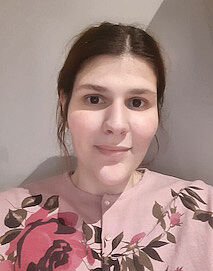
Yağmur Özbay
Yağmur Özbay is a PhD candidate in Social Psychology at the University of Amsterdam under the supervision of Dr. Eftychia Stamkou and Dr. Suzanne Oosterwijk.
She completed her BA degrees in psychology and sociology, with a minor in media and visual arts, at Koc University, Istanbul. After completing her MA studies in cognitive psychology, at the same university, she started her PhD at the UvA.
She is interested in the social ramifications of art, from micro-level effects of art engagement on social-cognitive abilities and its impact on interpersonal attitudes and behavior, to its macro-level implications on sociocultural systems. Currently, she explores if, and how, art engagement can facilitate social-cognitive abilities, and transform interpersonal processes and interactions.
Humboldt-Universität zu Berlin (HUB) DE

Humboldt-Universität zu Berlin (HUB) DE
Specific Department: Berlin School of Mind and Brain
Main individuals carrying out task
(1) Dr. Joerg Fingerhut, Postdoctoral Researcher, Berlin School of Mind and Brain, PI Einstein Group „Consciousness, Emotions, Values”;
(2) Prof. Dr. Michael Pauen, Professor for Philosophy of Mind, Institute for Philosophy; Academic director of the Berlin School of Mind and Brain
Dr. Joerg Fingerhut
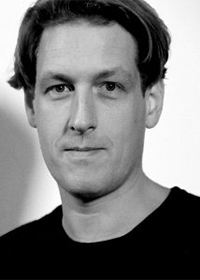
Dr. Joerg Fingerhut
Dr. Fingerhut is a postdoctoral researcher at the Berlin School of Mind and Brain. Following a PhD (cum laude) as a member of the "Collegium Picture Act & Embodiment," a joint project of art historians and philosophers, he was "Art & Neuroscience Postdoctoral Fellow” at Columbia University (2012), and assistant professor at the University of Stuttgart (2012-2015). His research focus is on the relation of embodied philosophy of mind and artifacts, such as architecture, pictures, and moving images. A specific interest lies in the cultural constitution of our mental states (integrative perspective on artifacts) and our aesthetic experience of them (interactionist perspective on artifacts). On the latter he has been collaborating with Einstein Visiting Fellow Prof. Jesse Prinz (CUNY) a leading expert in emotion theory in order to develop a theory of aesthetic emotion such as wonder and awe and their role in the evaluation of art (Fingerhut & Prinz 2018). He is a philosopher by training but has conducted a series of neurophysiological and behavioral experiments on aesthetic engagement with art. He has been using EEG technology to investigate our motor engagement with visual media such as film (in collaboration with Vittorio Gallese and Katrin Heimann), heart beat variability measures on our emotional engagement with art, as well as movement and eye-tracking technology to investigate our embodied engagement with art. He has published on the role of 4E (embedded, embodied, extended, enactive) theories of the mind in providing a bridge between the humanities and the cognitive sciences. He has presented empirical research at the main empirical aesthetics conferences (IAEA 2014,2016, 2018, SCSMI 2016, 2017, 2019, VSAC 2017). As Principal Investigator of the “Consciousness, Emotions, Values” group at the Berlin School of Mind and Brain he has been working at the interface of philosophy and empirical sciences and is an expert in mediation between different disciplines.
Prof. Michael Pauen

Prof. Michael Pauen
Prof. Pauen is a Professor of Philosophy at Humboldt-Universität zu Berlin and academic director of the Berlin School of Mind and Brain. His work focuses on the interface between neuroscience and philosophy. Central issues are consciousness, self-consciousness and free will. He is particularly interested in understanding how first-person experience is related to third person neuroscience and how empirical results concerning decision making can be integrated into an adequate theory of human freedom and responsibility. In addition, he works on the ethical consequences of neuroscientific research. He is collaborating with the Einstein Fellow Jesse Prinz to investigate the role of experimental methods for philosophy and the group of Einstein Visiting Fellow Vittorio Gallese “The Development of Identity: Socio-cultural practices from dyads to groups” on the impact of individual or joint (social) engagement with the arts (especially film).
University of Arts in Belgrade (FDU) RS

University of Arts in Belgrade (FDU) RS
Specific Department: Faculty of Dramatic Arts (Research Institute), University of Arts in Belgrade
Main individuals carrying out task
(1) Dr. Milena Dragićević Šešić, Professor, director of the Research Institute (Theatre, Film, Radio & Television), Faculty of Dramatic Arts
Prof. Dr. Milena Dragićević Šešić
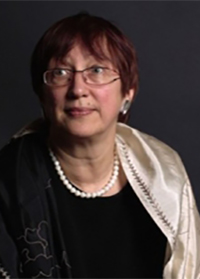
Prof. Dr. Milena Dragićević Šešić
Prof. Šešić is a cultural and media theorist and researcher, university professor, publicist, international expert and lecturer on cultural policy and management, editor, civil society activist and European networker. She is a former Rector of the University of Arts, Belgrade (2001–2004). Today, she is professor of Cultural Policy & Cultural Management, Cultural and Media Studies at the Faculty of Dramatic Arts in Belgrade, and the founder and currently head of the UNESCO Chair in Cultural Policy and Management (Interculturalism and Mediation in the Balkans) at the University of Arts, Belgrade. This chair was selected by UNESCO as one of the 10 UNESCO Chairs in the World that are relevant for the implementation of UNESCO 2005 Convention for the Preservation and the Promotion of the Diversity of Cultural Expressions. She is a permanent lecturer at European Diploma in Cultural Project Management, Brussels; Moscow School of Social and Economical Sciences; CEU Budapest; I.E.P. Grenoble; University Lyon II; Jagielonian University Krakow, Jyvaskyla University, Finland, University of Buffalo, USA, Columbia University New York, University for Culture, Riga, ECUME, Dijon; University of Skopje, etc. She was external examiner for the Master Program "Art & Media Management in a European Context", Utrecht School of the Arts; President of the Jury for the Cultural Policy Research Award (2004-2012); member of the expert team for Global Cultural Diplomacy Platform. She teaches a range of courses relating to cultural management, cultural diplomacy and media of mass communication.
Nina Mihaljinac, Ph.D
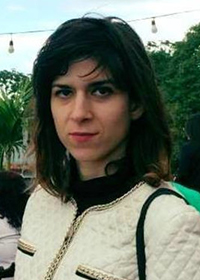
Nina Mihaljinac, Ph.D
Nina Mihaljinac, Ph.D, Assistant Professor of cultural management and cultural policy at the Faculty of Dramatic Arts Belgrade, the Faculty of Fine Arts Belgrade and the UNESCO Chair in Cultural Management and Cultural Policy, University of Arts Belgrade. Her main research interests are: cultural policy, cultural studies, contemporary visual arts, international relations and creative industries. Nina Mihaljinac is a guest lecturer at the Université Lumière Lyon 2. She published four books and many research papers and has participated in several national and international research projects in cultural policy, cultural management and culture of remembrance. She also works as a project manager in the Creative Europe Desk Serbia within the Ministry of Culture and Information of Republic of Serbia, as an international cultural management trainer, and is a founder of the Center for artistic research.
Ljiljana Rogač Mijatović, PhD
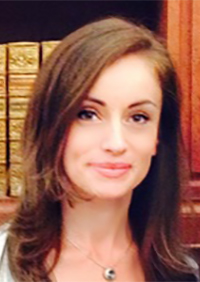
Ljiljana Rogač Mijatović, PhD
Ljiljana Rogač Mijatović, PhD, Senior Research Associate at Faculty of Dramatic Arts, lecturer at master studies UNESCO Chair in Cultural Policy and Management, and lecturer at PhD studies of the University of Arts in Belgrade. The core fields of her expertise include: international cultural relations and intercultural communication, cultural diplomacy, cultural policy, and cultural identity. She has gained an extensive experience in the public sector, working for cultural institutions, festivals, as well as in tourism. Her book "Cultural diplomacy and the identity of Serbia" is a pioneering study in the field. She is a member of the several international research projects: COST IS 1007 Investigating Cultural Sustainability, COST IS 1308 Populist Political Communication in Europe, COST IS1203 In search of transcultural memory in Europe; COST IS 1307 New Materialism: Networking European Scholarship on 'How Matter Comes to Matter', COST CA 16213 New Exploratory phase on research on East European Cultures of Dissent, Erasmus+ BEOPEN Boosting Engagement of Serbian Universities in Open Science.
Aarhus University (AAU) DK

Aarhus University (AAU) DK
Specific Department: School of Culture and Society, Interactive Minds Center
Main individuals carrying out task
(1) Dr. Katrin Heimann, Asst. Prof., School of Culture and Society, Interactive Minds Center
(2) Dr. Andreas Roepstorff, Prof. for Anthropology, Director Interacting Minds Center, School of Culture and Society
Katrin Heimann, PhD
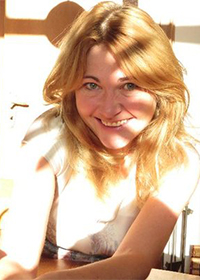
Katrin Heimann, PhD
Dr. Heimann, alumni of the German Academic Scholarship Foundation, conducted her PhD in Neuroscience at the University of Parma, Italy, as fellow of the integrated Marie-Curie ITN program TESIS (Towards an Embodied Science of InterSubjectivity). Her thesis focused on neurological responses to different elements of film style and the implications of these for spectators’ experiences. She was recruited by Aarhus University right after her PhD, became European based fellow at the Einstein Group "Consciousness, Emotions, Values" in Berlin in 2017 and is currently Assistant Professor at the Interacting Minds Centre. Here she is working with three thematical foci: art and media-experiences, with a continuous special interest on film and other (audio-)visual media, the experience of playfulness as an embodied state of mind as well as the experience of care and indifference regarding social and environmental injustice as a potential way to behavioral change.
Methodologically, she combines behavioral and physiological measurements as well as third person observational data with qualitative interview data that is acquired using micro-phenomenology - a guided introspection method designed to assess subjective experience. She is Associate Editor of Frontiers in Psychology, Section Theoretical and Philosophical Psychology.
Prof. Dr. Andreas Roepstorff
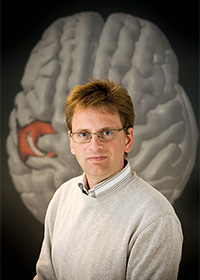
Prof. Dr. Andreas Roepstorff
Prof. Roepstorff is a professor of cognition, communication and culture in the departments of Culture and Society and Clinical Medicine, Aarhus University. He works at the interface between anthropology, cognitive science and neuroscience, and is equally interested in the workings of the mind and brain, and in how cognitive science and brain imaging, as fields of knowledge production, relate to other scientific and public fields. He has formal training in social anthropology and in neurobiology and has published widely both within these disciplines as well as in various collaborations across other fields, such as psychology, linguistics, clinical medicine, semiotics, and philosophy. He is the director of the Interacting Minds Centre at Aarhus University and is involved in a number of transdisciplinary collaborations, focusing on aspects of human interaction. He has a long-standing research interest in cognitive aspects of contemplative practices.
Kunsthochschule Weissensee (KHB) DE
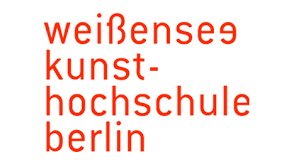
Kunsthochschule Weissensee (KHB) DE
Specific Department: Foundation Year Department
Main individuals carrying out task
(1) Ulf Aminde, Professor Kunsthochschule Weissensee
(2) Christine Goutrié, Professor Kunsthochschule Weissensee
Prof. Ulf Aminde
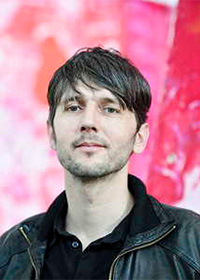
Foto: Uwe Niklas 2012
Prof. Ulf Aminde
Prof. Aminde is an artist, filmmaker and teaching activist. He is professor for Time Based Arts at the Weissensee academy of Art, Berlin in the Foundation Year department. There he initiated the *foundationClass for newcomers who want to start their studies at an art academy. In Cologne he will develop a film-based (and by using Augmented Reality also participative) monument in memory of the racist attacks by the terrorist NSU network in Probsteigasse and Keupstrasse. In his cinematic work he deals with the potential of self-empowerment through the performative camera, alienating effects in the documentary, and strategies of subjectivation. In doing so, he roams through categories of standardization, norms and questions social concepts such as discrimination and exclusion of minorities. His film works are mostly characterized by collaborations and experimental settings. He studied at Universität der Künste, Berlin with Lothar Baumgarten, where he graduated in 2004.
Prof. Christine Goutrié
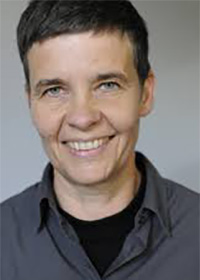
Prof. Christine Goutrié
Prof. Goutrié is a professor at the Weissensee School of Art and Design in Berlin since 2013 and teaches digital media in the foundation year for students of all degree programs. With her background in computer science, HCI, and interaction design she teaches with great enthusiasm first year students the basic concepts of digital media and encourages them to leave behind all their fears and skepticism towards coding. Her approach to establish inclusive spaces for all students with different experiences and backgrounds always integrates the political and socio-cultural dimension into her teaching of digital and online media. 2000 she became a professor at the University of Magdeburg-Stendal and established the new field of interaction design there. She developed and supervised several design programs, e.g. an online master’s program Cross Media which integrates interaction design, management and journalism as the core fields and uses a wide variety of online teaching methods. 2005/06 she was a guest professor at the UC Berkeley, USA at the Center of Information Technology in the Interest of Society and worked at the Berkeley Design Institute as well as at the computer science department. She was part of the interdisciplinary team of computer scientists and artists of the tele-immersion lab of Ruzena Bajcsi.
Royal Holloway, University of London (RHUL) UK
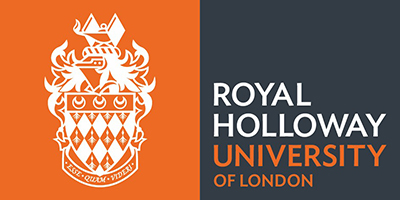
Royal Holloway, University of London (RHUL) UK
Specific Department: Department of Psychology
Main individuals carrying out task
(1) Prof. Dr. Manos Tsakiris, Professor of Psychology, Department of Psychology, Royal Holloway, University of London
Prof. Dr. Manos Tsakiris
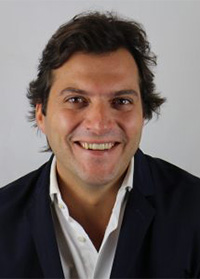
Prof. Dr. Manos Tsakiris
Prof. Tsakiris joined Royal Holloway in 2007 as a lecturer. By that time, his research on embodied cognition was already having an impact in the field. Soon after his appointment, he secured major funding from ESRC (2009-12) and ERC (2011-2016) and was promoted to professor in 2013. These innovative projects and the Lab of Action & Body (LAB) that he formed and led at RHUL shaped the contemporary psychological and neuroscientific understanding of body-awareness and self-identity in three key ways: (1) they developed a novel, comprehensive and empirically testable neurocognitive model of body-awareness (Tsakiris, 2010; 404 citations, the most cited review paper in the body-ownership literature). (2) They showed for the first time how multisensory information changes the mental representation of one’s identity (e.g. Tsakiris, 2008, 145 citations) and how changes in body representations result in measurable changes in social cognition such as changes in implicit biases (Maister et al., 2013; for a review see Maister, Slater, Sanchez-Vives & Tsakiris, 2015; ERC Starting Grant). (3) They showed for the first time how signals from within the body (i.e. interoceptive) and from the outside (i.e. exteroceptive) are dynamically integrated in self-awareness (e.g. Tsakiris et al., 2011, 193 citations). This novel direction motivated several new lines of research in his and other labs in a research area that has seen a 10-fold increase in publications over the last few years and with important implications for clinical psychology and psychiatry (e.g. body-image, anxiety), developmental psychology (e.g. emotion regulation), cognitive psychology (e.g. decision-making) and technological translation (e.g. wearable technology). With substantial funding from a recently awarded ERC Consolidator Grant (2017-2022), he now has the opportunity to consolidate the frontiers research on the interoceptive basis of cognition.
His research is highly interdisciplinary and uses a wide range of methods to investigate the neurocognitive mechanisms that shape the experience of embodiment and self-identity. He is the recipient of the Young Mind and Brain Prize in 2014 and the 22nd Experimental Psychology Society Prize in 2015. Since 2016, he is leading the interdisciplinary Body & Image in Arts & Science (BIAS) project at the Warburg Institute, and since 2017 the INtheSELF ERC Consolidator project at Royal Holloway. In 2016, thanks to the inaugural NOMIS Foundation Distinguished Scientist Award, Tsakiris developed an interdisciplinary project on secondment at the Warburg Institute. The ‘Body & Image in Arts & Science’ (BIAS, 2016-19) project capitalized on his expertise on embodiment to pave new ways in which we can study, across disciplines, how we (bodily) relate and respond to other humans in a culture powered by images
Interdisciplinary Forum Neurourbanism (IFNU) DE
Interdisciplinary Forum Neurourbanism (IFNU) DE
Specific Department: n/a
Main individuals carrying out task
(1) PD Dr. med. Mazda Adli, Chair, Fliedner Klinik Berlin Centre for Psychiatry, Psychotherapy and Psychosomatic Medicine; Director of the Mood Disorders Research Group Charité – Universitätsmedizin Berlin
PD Dr. med. Mazda Adli

PD Dr. med. Mazda Adli
Prof. Adli has dedicated his research and personal engagement to the development and treatment of mood disorders. His special area of interest are strategies to overcome treatment-resistant depression and bipolar disorder. Another area of interest is the investigation of factors which modulate individual stress vulnerability. His aim is to develop effective prevention strategies for stress-related diseases. In 2008 he founded a scientific network of psychiatric hospitals in the larger Berlin region which unifies the academic and non-academic sector to the "Berlin Research Network on Depression". In 2009 Mazda Adli initiated the annually held World Health Summit at the Charité as Executive Director. Under the patronage of the German Federal Chancellor and the French President the World Health Summit convenes thought leaders and decision makers from academia, the industries, NGOs and governments. Mazda Adli is the Chair of the Fliedner Klinik Berlin, a center for psychiatry, psychotherapy and psychosomatic medicine.
University of Oxford (UOXF) UK

University of Oxford (UOXF) UK
Specific Department: Ruskin School of Art
Main individuals carrying out task
(1) Dr. Sarah Hegenbart, Lecturer in art history at Technical University in Munich, currently acting as a substitute for the professorship of art research with a focus on contemporary arts at the Braunschweig University of Art (HBK Braunschweig)
(2) Dr. Anthony Gardner, Professor and Head of the Ruskin School of Art
Dr. Sarah Hegenbart

Dr. Sarah Hegenbart
Dr. Sarah Hegenbart is lecturer in art history at Technical University in Munich and is currently acting as a substitute for the professorship of art research with a focus on contemporary arts at the Braunschweig University of Art (HBK Braunschweig). Prior to this, she was a fellow at the Wissenschaftskolleg in Greifswald, where she pursued the research project “Diagnosing post-truth politics: Dialogical art and Black aesthetics”. Sarah is a member of Die Junge Akademie Mainz and member of the consortium of the Horizon 2020 research project “Art and Research on Transformations of Individuals and Societies”. Sarah completed a PhD on Christoph Schlingensief’s Opera Village Africa in Burkina Faso at the Courtauld Institute of Art in London, an M.St. in Ancient Philosophy at the University of Oxford, and a Magister in Philosophy and History of Art at the Humboldt University of Berlin.
Dr. Anthony Gardner

Dr. Anthony Gardner
Prof. Gardner is Head of the Ruskin School of Art at the University of Oxford, where he teaches Contemporary Art History and Theory and is a Fellow of The Queen’s College. He has published widely on subjects including postcolonialism, postsocialism and curatorial histories, and is an editor of the MIT Press journal ARTMargins. Among his books are Mapping South: Journeys in South-South Cultural Relations (Melbourne, 2013), Politically Unbecoming: Postsocialist Art against Democracy (MIT Press, 2015) and, also through MIT Press in 2015, the anthology Neue Slowenische Kunst: From Kapital to Capital (with Zdenka Badovinac and Eda Čufer), which was a finalist for the 2017 Alfred H. Barr Award for best exhibition catalogue worldwide. His latest book, co-authored with Charles Green (University of Melbourne), is Biennials, Triennials and documenta: The exhibitions that created contemporary art, published by Wiley- Blackwell in 2016.
